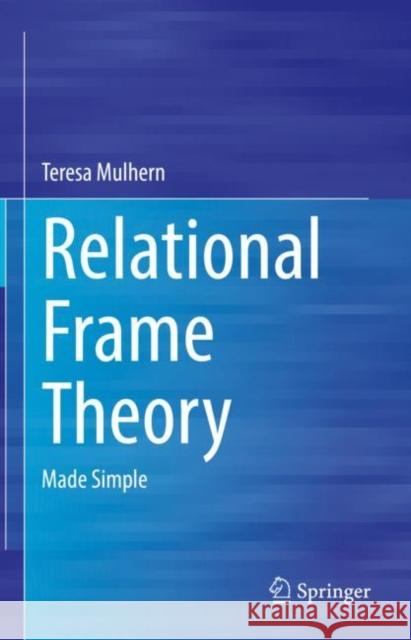Relational Frame Theory: Made Simple » książka
Relational Frame Theory: Made Simple
ISBN-13: 9783031194207 / Angielski / Twarda / 2022 / 231 str.
Relational Frame Theory: Made Simple
ISBN-13: 9783031194207 / Angielski / Twarda / 2022 / 231 str.
(netto: 575,06 VAT: 5%)
Najniższa cena z 30 dni: 578,30
ok. 22 dni roboczych
Dostawa w 2026 r.
Darmowa dostawa!
Relational Frame Theory: What is it? Why is it important? How can I use it? This book dispels the confusion surrounding Relational Frame Theory and provides an easy-to-understand briefing of Relational Frame Theory and its’ components, with examples to enhance and ease understanding. Recent research has indicated that Relational Frame Theory may form the cornerstone of language and intelligence and this textbook integrates this information into an easily digestible format, considering the importance of each relational frame from coordination to analogy. Relational Frame Theory provides a potentially useful framework for teaching language and academic skills and the current textbook provides some examples of how to do this and offers some considerations for future research in this area.This book makes Relational Frame Theory easy to understand and, unlike previous books, assumes no prior knowledge of the theory amongst readers and clarifies some of the jargon used within this body of work. This book provides the most up-to-date outline of previous work within Relational Frame Theory and gives an overview of how this theory could be applied within psychology. To date, no previous book has attempted to integrate research, application and an easy-to-understand overview of the theory together – this book aims to integrate all of these aspects into one easily comprehensible guide.The current textbook is aimed towards graduate students and practitioners of applied behavior analysis. Given the proposed changes to the Behavior Analysis Certification Board which will focus more on Relational Frame Theory than in the past, a book of this nature will be helpful for those pursuing certification and may also be helpful for use within the applied field.
Relational Frame Theory: What is it? Why is it important? How can I use it? This book dispels the confusion surrounding Relational Frame Theory and provides an easy-to-understand briefing of Relational Frame Theory and its’ components, with examples to enhance and ease understanding. Recent research has indicated that Relational Frame Theory may form the cornerstone of language and intelligence and this textbook integrates this information into an easily digestible format, considering the importance of each relational frame from coordination to analogy. Relational Frame Theory provides a potentially useful framework for teaching language and academic skills and the current textbook provides some examples of how to do this and offers some considerations for future research in this area. This book makes Relational Frame Theory easy to understand and, unlike previous books, assumes no prior knowledge of the theory amongst readers and clarifies some of the jargon used within this body of work. This book provides the most up-to-date outline of previous work within Relational Frame Theory and gives an overview of how this theory could be applied within psychology. To date, no previous book has attempted to integrate research, application and an easy-to-understand overview of the theory together – this book aims to integrate all of these aspects into one easily comprehensible guide. The current textbook is aimed towards graduate students and practitioners of applied behavior analysis. Given the proposed changes to the Behavior Analysis Certification Board which will focus more on Relational Frame Theory than in the past, a book of this nature will be helpful for those pursuing certification and may also be helpful for use within the applied field.











